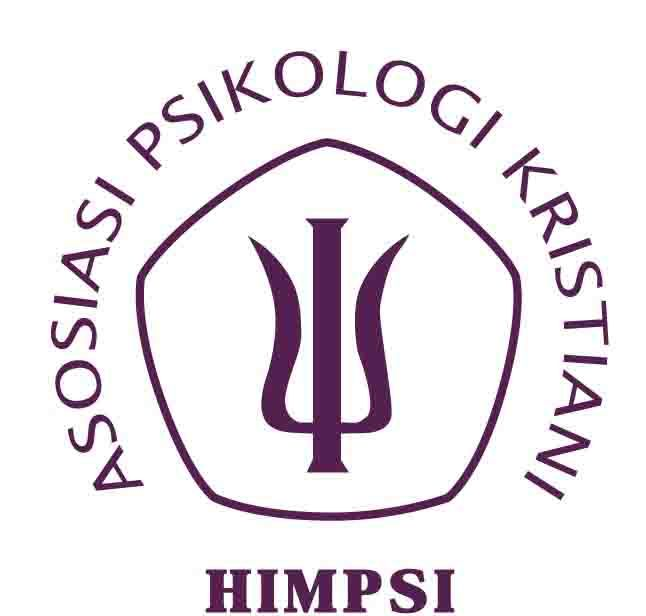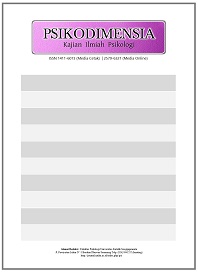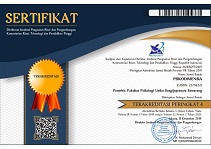Relationship Between Spiritual Intelligence with Resilience in Teenagers Born in Poor Families
Abstract
Keywords
Full Text:
PDFReferences
Almedom, A. M., & Tumwine, J. K. (2008). Resilience to disasters: a paradigm shift from vulnerability to strength. African Health Sciences, 8 Suppl 1, S1-4. Retrieved from http://www.pubmedcentral.nih.gov/articlerender.fcgi?artid=3060724&tool=pmcentrez&rendertype=abstract
Azwar, S. (2012). Penyusunan Skala Psikologi. Yogyakarta: Pustaka Belajar.
Badan Pusat Statistik. (2018, 2 Januari). Presentase Penduduk Miskin September 2017 Mencapai10,12 Persen. Diperoleh 14 Februari 2018. https://www.bps.go.id/pressrelease/2018/01/02/1413/persentase-penduduk-miskin-september-2017-mencapai-10-12-persen.html.
Block, J., & Turula, E. (1963). Identification, Ego Control, and Adjustment. Child Development, 34(4), 945.
https://doi.org/10.2307/1126537
Cahyani, Y. E., & Akmal, S. Z. (2017). Peranan Spiritualitas Terhadap Resiliensi Pada Mahasiswa Yang Sedang Mengerjakan Skripsi. Psikoislamedia : Jurnal Psikologi, 2(1), 32.
https://doi.org/10.22373/psikoislamedia.v2i1.1822
Christensen, C. M., & Overdorf, M. (2002). Disruptive Change. Harvard Business Review, 80(April), 94–101.
https://doi.org/10.1002/rwm3.20019
Connor, K. M., & Davidson, J. R. T. (2003). Development of a new Resilience scale: The Connor-Davidson Resilience scale (CD-RISC). Depression and Anxiety, 18(2), 76–82.
https://doi.org/10.1002/da.10113
Hammouri, K. A., & Abdulaziz A. S. (2016). Spiritual Intelligence and the Differences among Gifted and Non-gifted Students, According to Gender and Class Level. American Journal of Educational Research, 4(15), 1086–1095. https://doi.org/10.12691/education-4-15-6
Hurlock, EB. (2003). Psikologi Peerkembangan anak jilid 2. Jakarta: Erlangga.
Herrman, H., Stewart, D. E., Diaz-Granados, N., Berger, E. L., Jackson, B., & Yuen, T. (2011). What is resilience? Canadian Journal of Psychiatry, 56(5), 258–265. https://doi.org/10.1177/070674371105600504
Holland, R. (2013). Educating Urban At-Risk Students on Aspect s of Life Skills and Personal Management While enrolled at Borough of Manhattan Community College. Journal of Chemical Information and Modeling, 53(9), 1689–1699. https://doi.org/10.1017/CBO9781107415324.004
Isdijoso, W., Suryahadi, A., & Akhmadi. (2016). Penetapan Kriteria dan Variabel Pendataan Penduduk Miskin yang Komprehensif dalam Rangka Perlindungan Penduduk Miskin di Kabupaten / Kota. The SMERU Reaserch Institute. 1-25. http://www.smeru.or.id/sites/default/files/publication/cbms_criteria_ind.pdf
Kalil, A. (2003). Family Resilience and Good Child Outcomes. A review of the literature. New Zealend: Ministry of Social Development. https://www.msd.govt.nz/documents/about-msd-and-our-work/publications-resources/archive/2003-family-resilience-good-child-outcomes.doc
King, D. B., & Decicco, T. L. (2009). A Viable Model and Self-Report Measure of Spiritual Intelligence. International Journal of Transpersonal Studies, 28(1), 68–85.
Mawarpury, M. & Mirza. (2017). Resilience in Family: Psychological Perspective. Jurnal Psikoislamedia, 2(April), 96–106.
Nay, T.O., & Dewanti, R. (2013). Hubungan Kecerdasan Spiritual Dengan Resiliensi Pada Mahasiswa Yang Mengikuti Program Akselerasi. Jurnal Tabularasa. 8(2), 708-716.
Pasudewi, C. Y. (2012). Resiliensi Pada Remaja Binaan Bapas Ditinjau Dari Coping Stress. Journal of Sosial and Industrial Psychology, 2(1), 64–68.
Rahmasari, L. (2012). Pengaruh Kecerdasan Intelektual, Kecerdasan Emosi dan Kecerdasan Spiritual Terhadap Kinerja Karyawan. Majalah Ilmiah INFORMATIKA, 3(1), 1–20.
Reivich, A. K., & Shatte. A. (2002). The Resilience Factor: 7 Keys to Finding Your Strength and Overcoming Life’s Hurdles. Three Rivers press. https://www.deeelliottconsulting.com/system/files/The%20Resilience%20Factor.pdf
Rinaldi. (2010). Resiliensi pada masyarakat kota padang ditinjau dari jenis kelamin. Jurnal Psikologi, 3(2), 99–105.
Riza, M., & Herdiana, I. (2013). Resiliensi pada Narapidana Laki-laki di Lapas Klas 1 Medaeng. Jurnal Psikologi Kepribadian Dan Sosial, 2(1), 1–6
Septiani, T., & Fitria, N. (2016). Hubungan Antara Resiliensi Dengan Stres Pada Mahasiswa Sekolah Tinggi Kedinasan. Jurnal Penelitian Psikologi, 7(2), 59–76.
Setyowati, A., Hartati, S., & Sawitri, D. R. (2010). Hubungan Antara Kecerdasan Emosional dengan Resiliensi Pada Siswa Penghuni Rumah Damai. Psikologi Undip, 7(1), 67–77.
Sina, P. G., & Noya, A. (2012). Pengaruh Kecerdasan Spiritual Terhadap Pengelolaan Keuangan Pribadi. Jurnal Manajemen, 11(2), 171–188.
https://doi.org/10.28932/jmm.v11i2.183
Sisca, H., & Moningka, C. (2008). Resiliensi Perempuan Dewasa Muda Yang Pernah Mengalami Kekerasan Seksual Di Masa Kanak-Kanak. Jurnal Psikologi, 2(1), 61–69. Retrieved from http://www.ejournal.gunadarma.ac.id/index.php/psiko/article/viewFile/245/186
Soetjinigsih, C. H. (2012). Perkembangan anak: Sejak Pembuahan Sampai Dengan Kanak-kanak Akhir. Jakarta: Prenada
Stapleford, F. N. (1919). Causes of Poverty. The Public Health Journal, 10(4), 157–161. Retrieved from
http://www.jstor.org/stable/41975717
Sugiyono, (2011). Metode penelitian administrasi. Bandung: Alfabeta
Sukmawati, N. L. G., Herawati, N. T., & Sinarwati, N. K. (2014). Pengaruh etika profesi, kecerdasan intelektual, kecerdasan emosional, dan kecerdasan spiritual terhadap opini auditor. E-Journal S1 Ak Universitas Pendidikan Ganesha, 2(1) 1-11.
https://www.google.co.id/search?q=54-2484-1-SM.pdf&oq=54-2484-1 SM.pdf&aqs=chrome..69i57.968j0j4&sourceid=chrome&ie=UTF-8
Ulina, M. O., Kurniasih, O. I., & Putri, D. E. (2013). Hubungan Religiusitas dengan Penerimaan Diri pada Masyarakat Miskin. Jurnal Proceeding PESAT, 5, 17-22.
Uyun, Q. R. (2012). Sabar Dan Shalat Sebagai Model Untuk Meningkatkan Resiliensi di Daerah Bencana, Yogyakarta. Journal Psychology Intervention, 4(2), 253–267.
Yantiek, E. (2014). Kecerdasan emosi, kecerdasan spiritual dan perilaku prososial remaja. Persona, Jurnal Psikoloi Indonesia, 3(1), 22–31.
Zohar, M., & Marshall, I. (2000). Spiritual Intelligence, The Ultimate Intelligence. London: Bloomsburry Publishing, Inc. https://books.google.co.id/books?id=bfhSGrIm7KIC&printsec=frontcover&hl=id&source=gbs_ge_summary_r&cad=0#v=onepage&q&f=false
Guilford, J.P. (1956). Fundamental Statistics in Psychology and Education. (p. 145). New York: McGraw Hill.
https://books.google.co.id/books?id=fbWeqTuQUwgC&q=Fundamental+Statistics+in+Psychology+and+Education&dq=Fundamental+Statistics+in+Psychology+and+Education&hl=en&sa=X&ved=0ahUKEwja4OnWvfvaAhXBvLwKHdL4D9oQ6AEIJzAA
DOI: https://doi.org/10.24167/psidim.v17i2.1533
Print ISSN : 1411-6073 | online ISSN : 2579-6321 View My Stats

This work is licensed under a Creative Commons Attribution 4.0 International License.




















